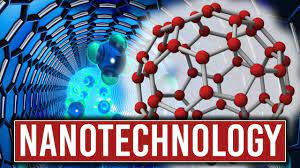Nanotechnology, also known as nanoscience, is
the study and application of extremely small substances or nanostructures used
in the field of science. The term ‘nanotechnology’ was coined by Norio
Taniguchi, a professor at Tokyo University of Science in 1974. It’s interesting
to imagine the size of nanotechnology which is around 10 -9 of a
meter (which is extremely small).

| A nanometer is one thousand millionth of a meter |
| 1nm = 10 -9 of a meter |
Everything around us is matter like food,
clothes, houses, etc and atom is known to be the smallest particle in matter.
However, the size of the atom is so small that it cannot be seen with naked
eyes, so scientists came up with the Atomic Force Microscope (AFM) and Scanning
Tunnelling Microscope (STM) to see atomic particles. This is when the age of
nanotechnology began.

Over 100 years ago, artists back then actually used alternate-size silver and gold particles as nanoscale materials which would develop colours in the stained glass windows of churches. They were unaware of the fact that the substances used were actually changing the composition of the material. Now, engineers and scientists are extracting ways to create nanoscale materials because of their lighter weight, higher strength, greater chemical reactivity and increased control of the light spectrum.
Reasons to Study Nanotechnology Courses
Check out the top reasons why you should pursue Nanotechnology courses:
- Nanotechnology is one of the fastest-growing fields of science and technology catering to growing career opportunities all across the world.
- It is a multi-disciplinary area to master your skills in physics, chemistry, biology, and mathematics in order to create a stimulating experience.
- Nanotechnology is used everywhere and possesses a revolutionary impact on the technology of science.
- Major universities and colleges which are globally recognised are offering opportunities for international students to study nanotechnology courses.
- Nanoscience and technology are predicted to develop potentially enormous economic impact.
- Nanotechnology has a societal impact on computer and microelectronics revolution.
- Nanomedicines are used by developing countries to help prevent several health issues and find possible treatment for diseases.
- Moreover, it is also being used in a variety of purification and industrial processes.
- With the application of nanoscience in traditional energy sources, scientists are using nanotechnology to create affordable, clean and renewable energy sources to reduce toxicity burdens on the environment.
What is Nanotechnology?
Nanotechnology is defined as the research and manipulation of matter at a scale of 1 to 100 nanometers (a nanometer is equal to 1 billionth of a meter). It has broad applications across a number of engineering and science fields including molecular engineering, molecular biology, medicine, chemistry and physics. Examples of nanotechnology applications in use include the targeting of medicine to cancer cells, reducing the size of transistors to build smaller electronics and improving the energy-generating capacity of solar cells.
Online Courses and Programs in Nanotechnology
Gain an understanding of nanotechnology with online courses from major universities and institutions. In Nanotechnology: Fundamentals of Nanotransistors from Purdue University, learn about the technology and physics behind nanoscale transistors. No prior understanding of transistors is needed. The course covers transistor fundamentals and then explains the nanoscience behind how they operate. Learn about how electrons flow in modern nanotransistors and understand the transmission theory of the MOSFET and the Landauer Approach to electron transport.
Take additional courses in microbiology, quantum mechanics and nanoelectronics and gain a broad understanding of the vast potential and uses of nanotechnology. Building and deploying technology at the nanoscale opens doors to great advances in a host of science and engineering fields. Many courses on edX are self-paced so you can enroll and start learning today.
Nanotechnology Courses Online
Introduction to the
Modern Nanotechnology
The aim of the course is a basic acquaintance with the concepts and approaches used in the field of nanomaterials design, fabrication and analysis. The course examines the physical basis of modern nanotechnology from the standpoint of semiconductor physics and quantum mechanics. The range of issues covered includes nanosystems classification by dimension, consideration of “bottom-up” and “from top down” approaches, examples of nanomaterials and nanosystems properties changes, the basis of practical device fabrication technologies for electronics, microwave photonics and photovoltaics, as well as the most important techniques for nanomaterial and device characterization.
Estimated 8 weeks2–3 hours per weekSelf-pacedProgress at your own speedFreeOptional upgrade available

MicroMasters® Program inNanoscience and Technology
What you will learn
- Essential physics of transistors, including modern nanoscale transistors.
- How to design high-performance nanoelectronics.
- Technology considerations and circuit applications.
- How to model modern photonic nanostructures and fiber optics.
- How to account for quantum transport phenomena in nanoscale devices and spintronics.
Program Overview
Nanoelectronic devices are an integral part of our life, including the billion-plus transistors in every smartphone, each of which has an active region that is only a few hundred atoms in length. This previously unimaginable scale has become possible by thoroughly understanding the critical mechanisms that take place at the scale of individual atoms and molecules. Similarly, nanophotonic devices are built into the core of modern life through technologies such as fiber-optic communications, also known as the backbone of the internet.
You can now learn how to design advanced nanoelectronics and nanophotonics from the creators of nanoHUB, the global nanotechnology research and education portal, even with no prior background in nanotechnology or quantum mechanics. A uniquely designed sequence of courses will help you develop a unified understanding of the essential physics of nanoscale electronic and photonic devices (e.g., field effect transistors, interconnects, lasers and modulators) as well as their important applications in integrated circuits and future electronic and photonic systems.
This sequence of short courses builds all critical concepts from the ground up. Starting from the familiar concepts behind Ohm’s law, the lessons in these short courses lead naturally to a new perspective on even some of the basic physics concepts. This unique viewpoint not only clarifies many old questions about what happens at smaller length scales than we can readily observe but also provides a powerful approach to new questions at the frontier of modern nanoelectronics, such as how devices can be built to control the spin of electrons or other exotic states. Concepts and applications in nanophotonics and fiber optics communications are also discussed. Furthermore, you will learn about the key enabling characteristics of the latest advances in nanophotonic, plasmonic, and metamaterial components and systems.
These courses are intended to be broadly accessible to students in any branch of science or engineering. Students should have a basic familiarity with calculus, elementary differential equations, and elementary circuit concepts such as Ohm’s law. No prior acquaintance with quantum mechanics is assumed. An introductory level understanding of basic semiconductor physics will also be helpful. This topic will be briefly reviewed in this MicroMasters® program and pointers to web-based lectures that cover background topics will be provided.
Our distinguished faculty will share their unique perspective built over 30+ years of leading-edge research and educational innovation in nanotechnology.Expert instruction6 graduate-level coursesInstructor-ledAssignments and exams have specific due dates8 months7 – 9 hours per week6 Academic CreditsBuild your skills and your transcript$4,500USDFor the full program experience
Courses in this program
- PurdueX’s Nanoscience and Technology MicroMasters® Program
- Semiconductor Fundamentals
- Nanophotonic Modeling
- Fundamentals of Current Flow
- Fundamentals of Transistors
- Fiber Optic Communications
- Introduction to Quantum Transport
nanotechnology engineering courses
There are various courses in Nanotechnology offering individuals to develop skills and knowledge to contribute to the field of science and technology related to nanoparticles. Below is a list of bachelor courses to pursue a career in nanotechnology:
| Education Level | Nanotechnology Courses |
| Bachelor’s Level | B.Sc in Nanoscience B.Sc in Chemistry with Nanotechnology B.Sc (Hons) in Nanotechnology Bachelors in Chemistry with Green Nanotechnology B.S. in Nanosystem Engineering |
| Master’s Level | M.Sc in Nanotechnology M.Sc in Nanoscience and Technology M.Tech in Nanotechnology M.Tech in Nanotechnology and Nanomaterials M.Tech in Material Science and Nanotechnology |
| Doctoral Level | Ph.D. in Nanotechnology Ph.D. in Nanoscience and Technology |
Nanotechnology Courses After 12th
Just passed out after the 12th and wondering about the courses you can pursue in the field of Nanotechnology. We have curated a list of courses you can consider:
- B.Sc in Nanoscience
- B.Sc in Chemistry with Nanotechnology
- B.Sc (Hons) in Nanotechnology
- Bachelors in Chemistry with Green Nanotechnology
- B.S. in Nanosystem Engineering
Nanotechnology Engineering Courses
Nanotechnology engineering courses are most popular in this field. Here is the list of top nanotechnology courses you can pursue:
- BTech Nanotechnology
- BE Nanotechnology
- MTech Nanotechnology
- ME Nanotechnology
- MTech Functional Materials and Nanotechnology
- MTech Nanotechnology Self Finance
Nanotechnology Certificate Course
If you are looking for certification courses in nanotechnology. There are plenty of options both online and offline. Check out the list of best nanotechnology certification courses:
- Nanotechnology: A Maker’s Course by Duke University
- Nanotechnology and Nanosensors, Part1 by Israel Institute of Technology
- Understanding Einstein: The Special Theory of Relativity by Stanford UNiversity
- Design of bulk nanostructured metal materials by Polytech
- Nanotechnology and Nanosensors, Part 2 by Technion